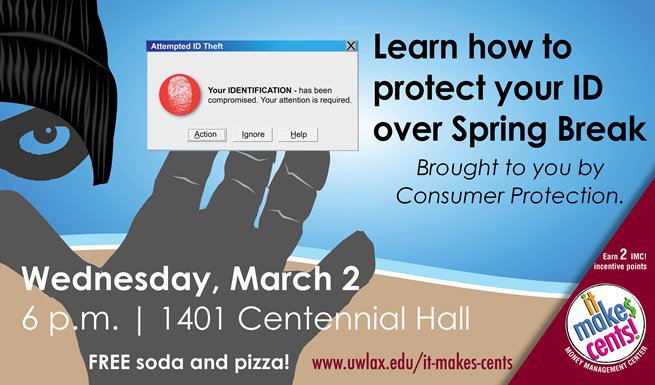Posted 8:51 a.m. Friday, Feb. 26, 2016

Discover how to protect your identity on spring break.
Discover how to protect your identity on spring break
 Students on spring break are typically in an unfamiliar place, surrounded by unfamiliar people and making a lot of financial transactions. It’s a perfect recipe for identity theft, says Amanda Gasper, UWL financial literacy program coordinator.
Laura Fay, an agent from the Office of Privacy Protection in Madison, will share ways students can keep their identity safe and secure while on spring break, as well as current identity theft trends, at 6 p.m. Wednesday, March 2, in 1401 Centennial Hall.
The event is free and open to the public. The program is sponsored by It Make$ Cents, UWL’s financial literacy program, as part of the 2016 spring list of life skills building events.
“Everyone can benefit from attending this event,” says Gasper. “Americans are the No. 1 target and victims of identity theft.”
During spring break, students who travel may be distracted by the adventure while also carrying sensitive information, says Fay.
“By letting their guard down, students give identity thieves an advantage,” she says.
One of the more popular scams, says Fay, involves students’ family members. An identity thief will contact the grandparent of a student away on vacation, pose as the student and claim that they are in trouble and need money. The thief will create a sense of urgency and convince the grandparent to wire large sums of money without asking any questions.
Tips to avoid identity theft
- from Laura Fay, an agent from the Office of Privacy Protection in Madison
Students on spring break are typically in an unfamiliar place, surrounded by unfamiliar people and making a lot of financial transactions. It’s a perfect recipe for identity theft, says Amanda Gasper, UWL financial literacy program coordinator.
Laura Fay, an agent from the Office of Privacy Protection in Madison, will share ways students can keep their identity safe and secure while on spring break, as well as current identity theft trends, at 6 p.m. Wednesday, March 2, in 1401 Centennial Hall.
The event is free and open to the public. The program is sponsored by It Make$ Cents, UWL’s financial literacy program, as part of the 2016 spring list of life skills building events.
“Everyone can benefit from attending this event,” says Gasper. “Americans are the No. 1 target and victims of identity theft.”
During spring break, students who travel may be distracted by the adventure while also carrying sensitive information, says Fay.
“By letting their guard down, students give identity thieves an advantage,” she says.
One of the more popular scams, says Fay, involves students’ family members. An identity thief will contact the grandparent of a student away on vacation, pose as the student and claim that they are in trouble and need money. The thief will create a sense of urgency and convince the grandparent to wire large sums of money without asking any questions.
Tips to avoid identity theft
- from Laura Fay, an agent from the Office of Privacy Protection in Madison
- Know what’s in your wallet. Limit the number of cards you carry and make a photocopy of everything in your wallet. The photocopies will provide all the contact information needed in the event your wallet is stolen.
- Never carry your social security card or your passport. Make a photocopy, if necessary, and keep the original copy in a secure location.
- Never keep passwords or PIN numbers in your wallet.
- Don’t carry a checkbook. A checkbook is like hitting the jackpot for an identity thief because of all the personal information it contains, as well as bank routing numbers and account numbers.
- Know who you are dealing with while making transactions.
- Use caution when using public Internet. Thieves can monitor information while on public Wi-Fi networks.
- Place a hold on your mail with the post office. Many scammers use spring break as an opportunity to peruse student mailboxes.
- Alert your financial institution and credit card company of your travel plans. The company’s fraud department can spot a potential misuse of your accounts.
